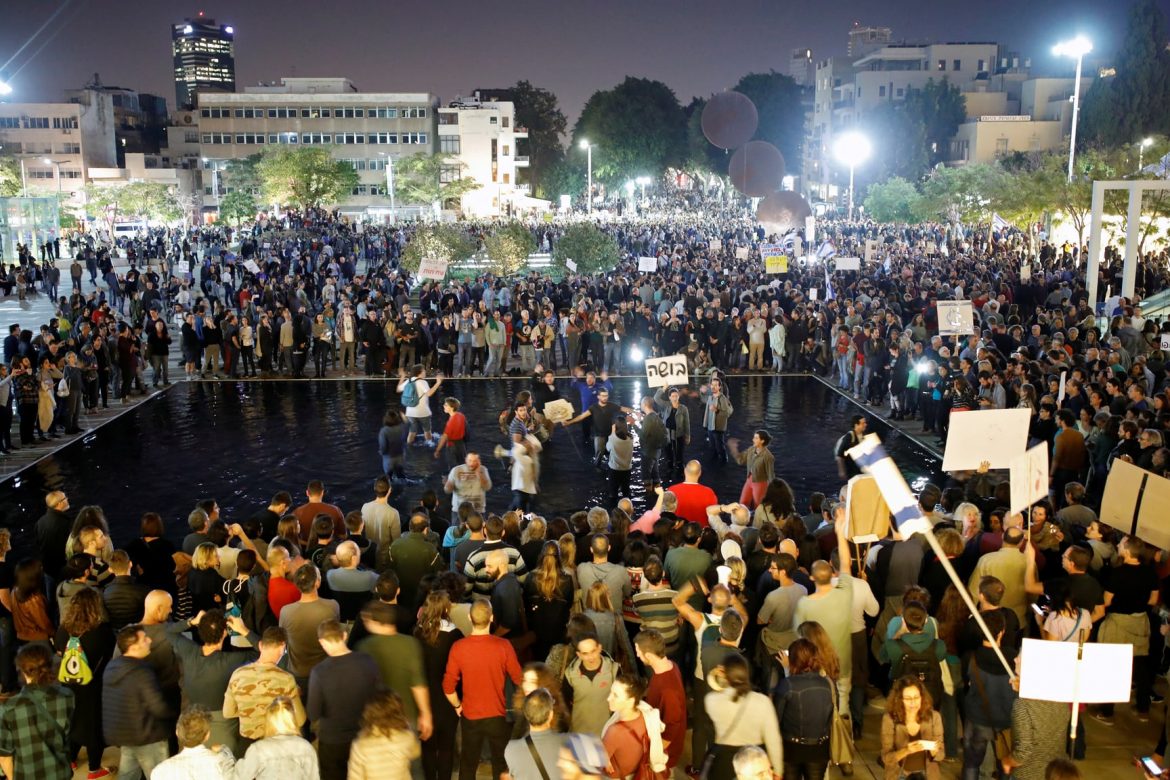This material belongs to: Reuters.
JERUSALEM (Reuters) – About 20,000 Israelis demonstrated in Tel Aviv on Saturday against government corruption and Prime Minister Benjamin Netanyahu who is under criminal investigation over allegations of abuse of office.
The demonstration was by far the largest of weekly anti-corruption protests sparked by corruption allegations against Netanyahu, who denies any wrongdoing.
The four-term leader is suspected of involvement in two cases. The first involves receiving gifts from wealthy businessmen and the second involves negotiating a deal with a newspaper owner for better coverage in return for curbs on a rival daily.
Saturday’s protest was prompted by a draft law expected to be ratified by parliament next week, which would bar police from publishing its findings in two investigations of Netanyahu.
A Reuters cameraman and Israeli media put the number of demonstrators at about 20,000. Police would not provide an official estimate.
Critics say the draft law is a blatant attempt to protect Netanyahu and keep the public in the dark about his investigation. Supporters of the legislation say it is meant to protect suspects’ rights.
Netanyahu has said he has no interest in promoting personal legislation but he has not ordered its two sponsors, close confidants in his Likud party, to withdraw the bill.
Netanyahu has described himself as a victim of a political witch hunt and said of the cases against him: “There will be nothing because there is nothing.”
If charged, he would come under heavy pressure to resign or could call an election to test whether he still had a mandate.

Netanyahu tells backers to reword contentious police bill after protests
This material belongs to: The Guardian.
Israeli PM says he has asked for legislation on police investigations to be redrafted so it does not apply to his own case.
The Israeli prime minister, Benjamin Netanyahu, has ordered his backers to reword a contentious piece of legislation that could potentially stifle a police investigation against him, in what appeared to be an attempt to defuse rising public anger against the Israeli leader.
The so-called “recommendations bill” would end the police’s current practice of recommending to prosecutors whether to indict suspects upon completing their investigations. It also aims to stem leaks from the investigations themselves, stating that no police recommendations be made public and penalising those found leaking to the media.
The bill has been pushed by Netanyahu’s staunchest allies in the Likud party, whipping up criticism that the beleaguered prime minister himself is seeking to pass legislation that would change the rules for police investigations and protect him from embarrassing revelations they may have discovered.
“Unfortunately, the debate over the recommendations bill has turned into a political weapon against an elected government,” Netanyahu wrote on Facebook on Sunday. He said he had asked a lawmaker behind the bill to ensure that it “be worded in a way that it won’t apply to the investigation taking place into my affairs”.
Netanyahu is suspected of receiving luxury gifts from wealthy supporters and has also faced police questioning over a secret deal he allegedly sought for favourable coverage with the publisher of the top-selling Israeli daily newspaper, Yedioth Ahronoth.
Tens of thousands of people protested in Tel Aviv on Saturday night against alleged corruption within the government and the slow pace of investigations of Netanyahu. It was one of the largest demonstrations yet against Netanyahu’s lengthy rule.
Protesters massed in a large boulevard of an upmarket neighbourhood late on Saturday shouting “shame” and “Bibi go home”, referring to the prime minister by his nickname.
“I think the time has come to change the government. The government is corrupt. We’re sick of the corrupt,” said a protester, Avi Elmozlinu.
The rally – dubbed “the march of shame” – was organised by the leaders of weekly protests that have taken place outside the home of the attorney general, Avichai Mandelblit, over the past few months.
“Bibi and his government are destroying the country. There’s been enough corruption,” said one demonstrator, Michal, a Tel Aviv resident who preferred not to give his full name.
The opposition leader, Isaac Herzog, expressed solidarity with the protesters, writing on Facebook that “the frustration … stems from a feeling of injustice, revulsion against corruption and the moral objection to a law made to measure for one person”.
On Sunday morning, Israeli police questioned a close Netanyahu ally on separate corruption charges. The coalition whip David Bitan – who is seen as the driving force behind the bill – was grilled in relation to accusations that he promoted the interests of criminals in return for debt relief, while he was a municipal politician years ago.
The bill’s future remains unclear. Netanyahu’s Likud party was set to bring the bill for a parliamentary vote on Monday, but appeared to be lacking support and working to delay the vote. There is speculation that the bill is being moved forward quickly so that it will apply to investigations taking place regarding Netanyahu.
The bill’s sponsor, David Amsalem, of Likud, said he sought only to protect the rights and reputation of suspects.
Netanyahu is suspected of having received luxury gifts from affluent individuals, including the Israeli businessman and Hollywood producer Arnon Milchan, who has also been questioned.
Milchan, a long-time friend of Netanyahu, reportedly sent him boxes of expensive cigars and other items worth tens of thousands of dollars.
Milchan has denied the gifts were part of any improper quid pro quo, according to Israeli media.
The police also suspect that Netanyahu sought a secret pact – not believed to have been finalised – under which he would have received favourable coverage in return for helping curb Yedioth’s competitor, the pro-Netanyahu freesheet Israel Hayom.
Netanyahu has consistently denied any wrongdoing and says he has been the target of a campaign by political opponents.
 info@anticorr.media
info@anticorr.media

